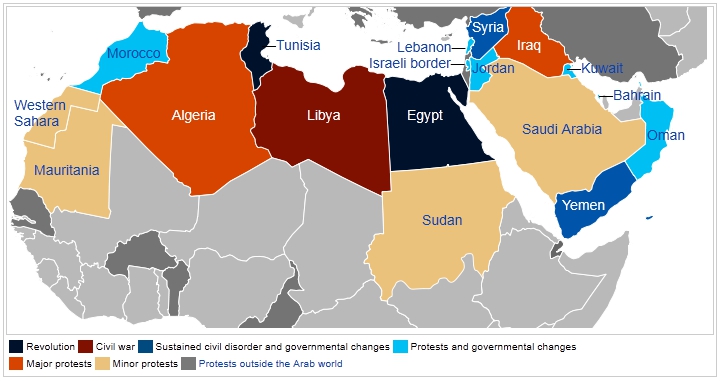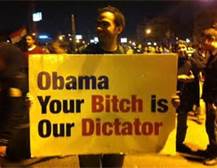This is Mohamed Bouazizi:

He was an anonymous Tunisian fruit merchant until December 17, 2010, when local police confiscated the 26-year-old’s weighing scales, keeping him from working. Angered and humiliated, Bouazizi went to the governor’s office to retrieve his scales and was ignored. After shouting in the middle of the street, “How do you expect me to make a living?”, he then did this to himself:

Bouazizi’s suicide set off protests that brought down Tunisian President Zine al-Abidine Ben Ali, who had ruled for 23 years. The “official” story was the protests were responses to unemployment and a lack of economic freedom, and the Arab Spring “movement” spread to Algeria, Bahrain, Egypt, Iran, Iraq, Jordan, Lebanon, Libya, Morocco, Palestine, Saudi Arabia, Syria, and Yemen; pretty much across North Africa and the Persian Gulf. By May 2011, only Kuwait and the United Arab Emirates were protest-free.
On May 19, 2011, American President Barack Obama gave a speech:
[youtube]http://www.youtube.com/watch?v=1GZFkwtLBLM[/youtube]
With that, the “official” story was “fixed”: the Arab Spring was about “self-determination”, “governments denying their citizens’ dignity”, and was reminiscent of America’s Founding Fathers defying George III, or Rosa parks keeping her bus seat. The Arab people were demanding freedom and the march toward democracy could not be denied. However, the true story…well, look at a map of North Africa:

Two and a half years after Bouazizi’s suicide overturned an Islamist government, Tunisia has: political instability and assassination, 17% unemployment, economic decline, sovereign debt downgraded to junk-bond status, another vendor self-immolation…and an Islamist government.
Algeria apparently weathered the Arab Spring well. Until militants attacked its Ain Amenas natural gas plant in January 2013, killing more than 80 people, and exposing anew the more than 2 decade-old struggle against Islamists.
The Shiite majority in Bahrain clashes politically with the Sunni minority that rules the the government. In response, Sunnis have jailed opposition leaders and relieved some Sunnis of their citizenship. Meanwhile, at least 55 people have died since the first massive protests of Feb 2011.
Jordan is less stable, as East Bank tribes grow distrustful of King Abdullah, along with a significant Palestinian refugee community, which supports an emboldened, and Islamist, Muslim Brotherhood.
Saudi Arabia’s absolute monarchy limits protests, but unrest in its Eastern provinces were buoyed by the Arab Spring. One expert believes the overthrow of King Abdullah is possible before 2017.
Despite his other flaws, former Libyan dictator Muammar Gaddafi kept a lid on Islamists. However, the Arab Spring, coupled with Western intervention in Libya’s 2011 “transition” deposed Gaddafi and strengthened Islamists. They and jihadist terrorists flexed their muscle in the brazen 2012 assault on the US consulate in Benghazi.
The Libyan victory heartened Islamists in the Syrian opposition seeking to topple president Bashar Al-Assad. Syria’s president is in deep trouble, and deeply offensive to many in the West and elsewhere. However, now the only in-country option to Al-Assad is the “pick-your-favorite-Islamists” one.
In Egypt, the Arab Spring replaced a 30-year dictator, Hosni Mubarak, with another would-be dictator, Mohamed Morsi, whom the Egyptian military removed after one year. Now the military, long respected as a stabilizing force in Egypt, is on the defensive about an attack on reportedly peaceful Morsi supporters that killed more than 50. This provides a sympathetic, and not aggressive or oppressive, portrayal of Islamists who invaded Egypt’s political structure following Mubarak’s downfall: as those whose legitimate election victory was improperly voided, and as victims of political violence.
So, what does this mean?
-
A) Islamists are moving toward control of North Africa,
B) The current US president has done much to support them, and
C) It also means the US is becoming a stench in the nostrils of those who oppose the islamists.
It started in 2009, pre-Arab Spring, when young Iranians protested the “landslide” re-election of President Mahmoud Ahmadinejad by chanting US President Obama’s name in the streets, asking, “Are you with us or against us?” Their play for democracy and freedom was ignored, souring Iranians on the idea that America stood for freedom…or against Islamist oppression.
President Obama declared US interests and values at risk, without saying what they were, as the reason for intervening in Libya’s civil war, directly contradicting public statements by then Secretary of Defense, Robert Gates. Obama’s policy was exposed in September 2012 by Al-Qaeda. Their 8-hour attack on the US consulate in Benghazi, during which the US president failed to defend US interests and values, came with Islamist shows of contempt, including posing for pictures,

and raping the US Ambassador before killing him. To date, the Obama administration holds no one accountable for the attack, though leads and suspects were known since October 2012. Islamists need not fear, nor respect, the US in that country.
Islamists in Syria received the same message via Obama’s “red line” warning. First, the US president indicated the movement or use of chemical weapons in Syria would make him rethink opposition to US involvement, but then Secretary of State Hillary Clinton re-drew the line to allow movement but prohibit use. Then Israel, Great Britain, Russia, France, and the UN all confirmed chemical weapons use in Syria, Obama backtracked further, acknowledging a “small amount” of usage, and that he needed to reconsider what to do, leaving the “red line”, and respect for American resolve, in tatters.
In Egypt, Islamists are regrouping, but US prestige is not. Obama backed the wrong horse, regarding freedom, when he supported the Muslim Brotherhood. Now, who can the US support? Neither Obama nor US interests have many friends left in Egypt, if pictures are any indication:


North Africa sees Obama’s foreign policy as pro-terrorist, and Islamist terrorists are uninterested in freedom. Consequently, an anti-American “glaze” is now brushed across the region, awaiting the kiln fire of violence to make it a hard shell opposed to American interests, no matter which side prevails. If the Islamists win, then Benghazi will represent the normal regard for US interests; if freedom wins, then that the US stood with the enemy will dull Arab ears to US concerns.
Since all this was US foreign policy, does anyone believe this is unintentional?

